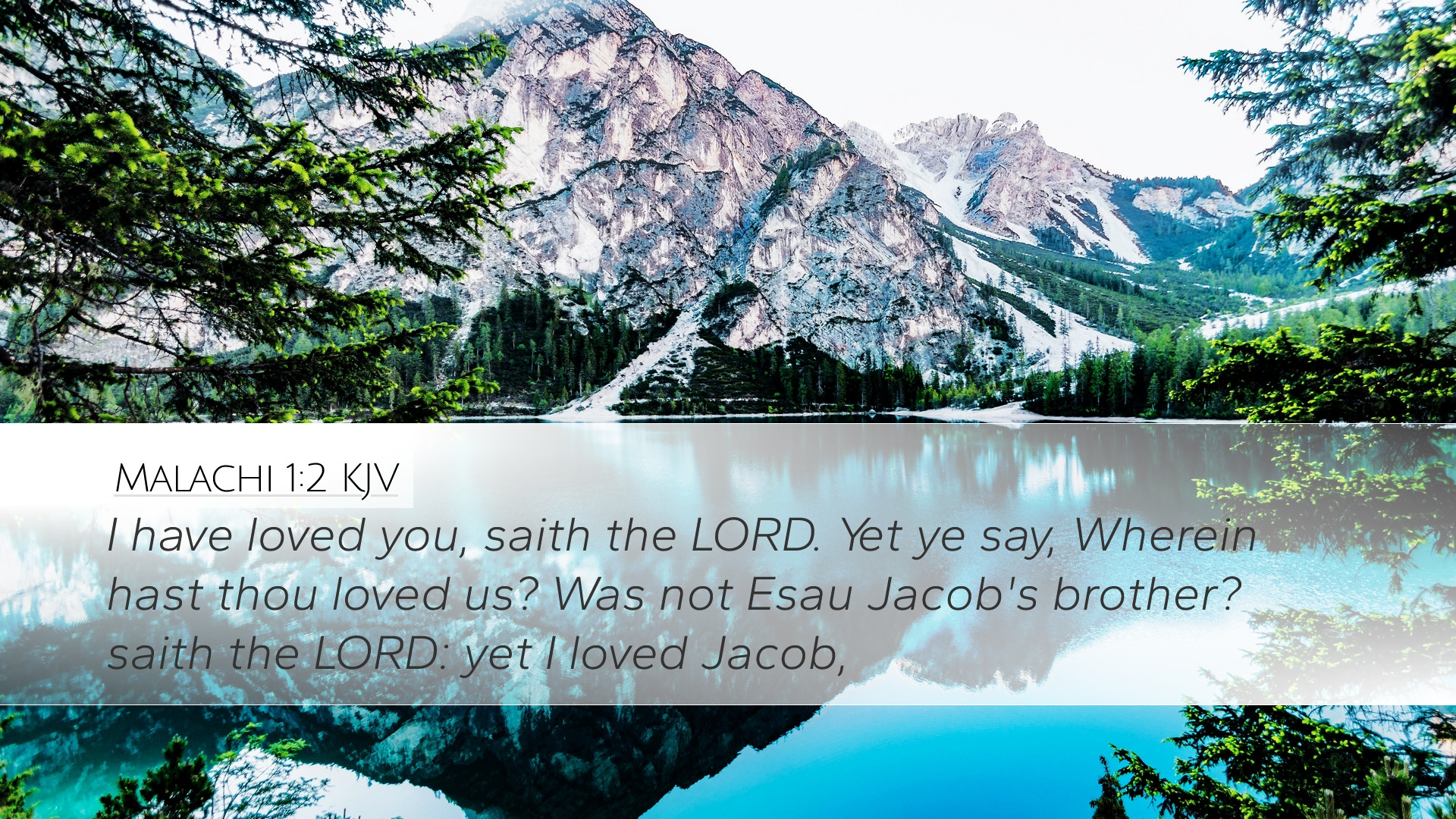Old Testament
Genesis Exodus Leviticus Numbers Deuteronomy Joshua Judges Ruth 1 Samuel 2 Samuel 1 Kings 2 Kings 1 Chronicles 2 Chronicles Ezra Nehemiah Esther Job Psalms Proverbs Ecclesiastes Song of Solomon Isaiah Jeremiah Lamentations Ezekiel Daniel Hosea Joel Amos Obadiah Jonah Micah Nahum Habakkuk Zephaniah Haggai Zechariah MalachiMalachi 1:2
Malachi 1:2 KJV
I have loved you, saith the LORD. Yet ye say, Wherein hast thou loved us? Was not Esau Jacob's brother? saith the LORD: yet I loved Jacob,
Malachi 1:2 Bible Commentary
Commentary on Malachi 1:2
Verse Context: Malachi 1:2 states, "I have loved you, says the Lord. But you say, ‘How have you loved us?’ Is not Esau Jacob's brother? declares the Lord. Yet I have loved Jacob
Introduction
The book of Malachi serves as a profound theological reflection on the covenant relationship between God and His people. Malachi addresses a post-exilic Israel that has experienced decline in fervor for the Lord. In this context, Malachi 1:2 encapsulates the theme of divine love as it contrasts the favored status of Jacob against Esau, illustrating God’s sovereign choice and persistent love.
Divine Affection and Human Doubt
Matthew Henry emphasizes the irony present in the verse, noting that God's declaration of love is met with skepticism from Israel. He states, “The Lord’s assertion of His love is profound, yet it is countered by a disheartened people who question its reality.” This reflects a deeper spiritual malaise among the Israelites, perhaps suggesting their struggle to perceive God’s ongoing favor despite the difficulties they face.
Albert Barnes further elaborates on the communal doubts of God’s people. He asserts that the question, “How have you loved us?” indicates a lack of recognition of God's providential care. Even amidst their circumstances, he reminds them to reflect on their historical identity as God’s chosen ones. Their inquiry invites reflection on their covenantal history.
Theological Implications of Divine Election
Malachi's reference to Jacob and Esau introduces critical themes of divine love and election. Adam Clarke remarks that God’s love for Jacob and hate for Esau is not arbitrary but founded in divine wisdom and purposes. “This comparison serves not merely as a historical record but as a profound indicator of God’s sovereign election in the unfolding plan of redemption.” Clarke emphasizes that God’s choice transcends human criteria, illustrating His grace.
Moreover, Matthew Henry notes that the love for Jacob is an emblem of God’s grace extended to the nation of Israel. This dynamic suggests that even their unfaithfulness does not diminish God’s commitment to His covenant. Henry concludes that God’s enduring affection draws out believers to appreciation and repentance.
Reflective Questions for the Church
- How do we perceive God’s love amidst our struggles and doubts?
- In what ways do we remind ourselves of our identity as God’s chosen people?
- How can the contrast between Jacob and Esau inform our understanding of divine grace and election?
Conclusion
The message of Malachi 1:2 transcends its historical context, speaking intimately to the hearts of believers today. In reflecting on God's love, both the church and individual believers are called to recognize and affirm their place in God’s unfolding story of grace.
As we engage with these insights, may we be encouraged to rest in the profound truth of God’s steadfast love, continually seeking to understand its implications for our worship, mission, and community life.
Further Study Recommendations
- Consider the implications of divine love in other prophetic literature.
- Examine the historical context of the Israelite community post-exile to understand their struggles.
- Reflect on the significance of covenantal theology and its relevance to contemporary faith.


